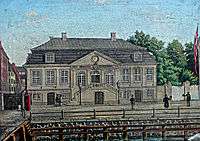Nicolai Abraham Holten
Nicolai Abraham Holten (27 March 1775 - 12 May 1850) was a Danish civil servant in the financial administration and director of Øresund Custom House.
Nicolai Abraham Holten | |
|---|---|
 | |
| Born | 27 March 1775 |
| Died | 12 May 1850 (aged 75) Helsingør, Denmark |
| Nationality | Danish |
| Occupation | Bankier and civil servant |
Early life and education
Holten was born in Copenhagen, the son of customs officer and former pharmacist Johannes (Hans) Holten (1741–1816) and Ane Margrethe Holten née Abildgaard (1747–1826). His grand father was royal furniture maker Johann von Holten and he was named after his maternal uncle Nicolai Abraham Abildgaard.
He attended Efterslægtselskabets Skole from October 1788 to September 1790.[1] He was later educated in Niels Ryberg's trading house.
Career

After completing his education Holten established his own business as a bankier and broker. He collaborated with the government and was in 1816 appointed to specialist director of national debt (statsgældsdirektør). He headed to office for foreign payments in 1817–39 and was a member of a commission that made a proposal for the important Negotiable Instrument Act (veksellov) of 1825. He was also used as a personal advisor on financial matters by Frederick VII.
Holten was appointed to director of Øresund Customs House in Helsingør in 1830 but continued as a member of the governing board of the national debt department until 1848.
He was appointed to etatsråd in 1817, Konferensråd in 1829 and Gehejmekonferensråd in 1847.[2]
Landowner
He purchased Lindegården on the Hornsherred peninsula in 1909 and the nearby manor of Krabbesholm in 1910. He used Lindegården as a summer residence and was responsible for many improvements of the management of his land. He was interested in trees and established a nursery on his estate. He was known for treating the farmers on his estate well and he founded the school in Skibby.
Personal life
Holten married Johanne (Hanne) Cathrine Kirstine Mangor (2 May 1778 - 20 November 1869) in the Church of the Holy Ghost in Copenhagen on 15 May 1799. She was a daughter of country doctor in Næstved and later city doctor in Copenhagen C. E. Mangor (1739–1801) and Marie Elisabeth Mangor néeKlagenberg (1743–1823).
Nicolai and Cathrine Holten had four children, one son and three daughters. Hans Christian Holten became a vicar of the parishes of Skuldelev and Selsø. Sophie Holten married the folklorist Just Mathias Thiele. The two other daughters did not survive childhood. Sophie Holten's daughters Ida and Anna grew up in their grand parent's home from they were five and three years old after their mother's death in 1835.[3]
Holten owned the Gustmeyer House in Copenhagen. He sold it when he was appointed to director for Øresund Custom House in 1839.[4]
He died on 12 May 1850. He was buried from St. Olaf's Church and interred at Assistens Cemetery.
References
- "Pengene". bramsnaeslokalhistorie.dk (in Danish). Archived from the original on 14 March 2018. Retrieved 14 March 2018.
- "Nicolai Holten". Dansk Biografisk Leksiko (in Danish). Retrieved 14 March 2018.
- "Hovedpersonerne". bramsnaeslokalhistorie.dk (in Danish). Archived from the original on 3 August 2016. Retrieved 14 March 2018.
- "Pengene". bramsnaeslokalhistorie.dk (in Danish). Retrieved 14 March 2018.
External links
| Wikimedia Commons has media related to Nicolai Abraham Holten. |
- Bicolai Abraham Holten at geni.com
- Holten Holten family